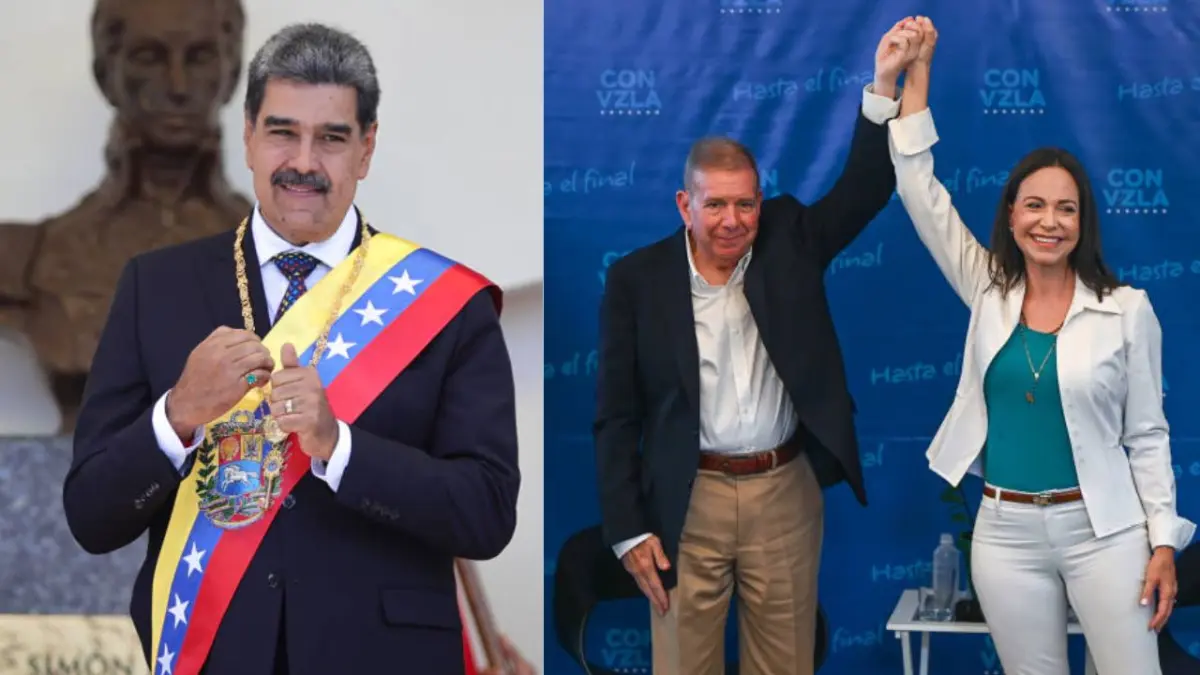
After proclaiming himself president of Venezuela, Nicolás Maduro today faces numerous challenges to remain in power. The international analyst of Noticias Caracol en vivo, María Teresa Aya, explained what challenges she will have to face in this new period, which will run from 2024 to 2031.
The expert explained that “the sanctions that (Maduro) has, both personally and at the state level. These last They will make it difficult for them to receive foreign currency, resources necessary for investment in the country, which will increase poverty, misery and discontent.”.
He added that we must remember that “we are talking about a country that is increasingly isolated and that depends, especially today, on the help of other countries that are called ‘pariahs’ in the international system such as Russia, North Korea e Irancountries that have numerous internal problems to continue dedicating time and resources to Venezuela in the amount that would be needed. This complicates the situation for him.”
(Also read: Edmundo González to institutions and military of Venezuela: “They must ignore the illegitimate regime”
)
Finally, “the opposition is going to remain firm, it is going to continue making protests and it is going to demand, both internally in Venezuela and internationally, that the triumph of Edmundo González be recognized.”
Maduro assumes third term in Venezuela questioned by the opposition
The president of Venezuela, Nicolás Maduro, assumed his third consecutive term this Friday, which the opponent Edmundo González Urrutiawho claims power, condemned considering that the leftist president “crowns himself a dictator.”
Maduro, in the presidency since 2013, took the oath in a ceremony with all the pomp at the headquarters of Parliament, under his control, as did all the country’s institutions, including the Armed Forces, which for the umpteenth time swore “loyalty and absolute subordination.”
From a distance, from his exile, González Urrutia ordered the military “to ignore the illegal orders given to him by those who confiscate power” and to guarantee conditions for his return to the country with the aim of pressuring for his inauguration, an idea always seen as unlikely by analysts.
Maduro “consumes a coup d’état, crowns himself a dictator,” the opponent concluded in a video that he posted on social networks.
JUAN BARRETO/AFP
“Law!”
“I swear” that “this new presidential period will be the period of peace, prosperity, equality and the new democracy,” promised an energetic Maduro, dressed in a dark suit, before the legislative head, the powerful Chavista leader Jorge Rodríguez.
“I swear it on history, I swear it on my life, and so I will comply!” added the leftist president, before receiving the presidential sash and necklace.
Aboard a military SUV, with escorts running to the sides, Maduro moved to the Venezuelan Military Academy, where he led an act of “recognition and reaffirmation of loyalty” before more than 3,200 uniformed personnel, who the head of the parade group defined as “revolutionary, socialist, anti-imperialist fighters and today more than ever deeply Chavista.”
Maduro asked for multiple oaths of loyalty from the military, police and followers of Chavismo, in an event in which his Nicaraguan counterpart, Daniel Ortega, was present.
(Also read: María Corina Machado gives details about the “detention” she had in Venezuela: “I heard several shots”
)
The electoral authority proclaimed Maduro the winner of the elections with 52% of the votes in the presidential elections, but to date the detailed count has not been published, as required by law. The opposition claims that González Urrutia won with 70% of the vote.
Maduro “did not put (the presidential sash) on his chest, he put it on his ankle like a shackle that will tighten him more every day,” said opposition leader María Corina Machado earlier.
González Urrutia “will come to Venezuela to be sworn in as constitutional president of Venezuela at the right time,” said Machado, who denounced his arrest after a protest the day before and his subsequent release, which the authorities have denied, calling the story “a lie.” “.
The government ordered the closure of the border with Colombia until Monday.
USD 25 million per
Maduro
The United States called the investiture a “farce” and raised the reward offered for the capture of Maduro and his Interior Minister, Diosdado Cabello, to $25 million; in addition to imposing sanctions against the head of the state oil company PDVSA, Héctor Obregón, and seven other senior Venezuelan officials.
At the same time, it extended to 18 months the protection that grants residence and work permits to Venezuelan migrants.
The next US president, Donald Trump, who referred to González Urrutia on Thursday as “president-elect”, could impose more sanctions in his second term, as he did in his first government.
The European Union noted that Maduro “lacks legitimacy.” The United Kingdom called it “fraudulent” and announced sanctions against 15 senior officials.
In contrast, Russian President Vladimir Putin conveyed his “congratulations” to his Venezuelan ally through his representative at the inauguration, Duma head Viacheslav Volodin.
“This takeover (…) they could not prevent it and it is a great victory for Venezuelan democracy,” launched a defiant Maduro, who promises a six-year term of “peace” and economic recovery, after spending a good part of his 12 years in power in recession, high inflation and shortages.
He proposes a “major reform” to the Constitution, which follows the path of the approval of new laws that, according to experts, reduce freedoms.
(Also read: María Corina Machado: Maduro “tramples the Constitution” supported by “dictators from Cuba and Nicaragua”
)
Source: https://www.noticiascaracol.com/mundo/los-retos-de-nicolas-maduro-al-asumir-un-tercer-periodo-presidencial-para-mantenerse-en-el-poder-rg10


